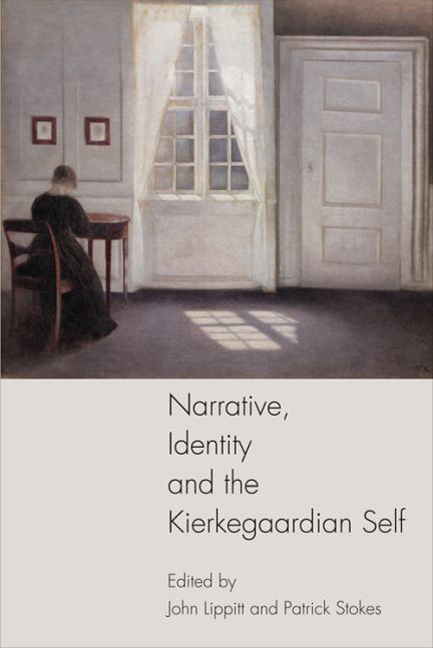Book contents
- Frontmatter
- Contents
- Acknowledgements
- Abbreviations
- Contributors
- Introduction
- 1 The Moments of a Life: On Some Similarities between Life and Literature
- 2 Teleology, Narrative and Death
- 3 Kierkegaard's Platonic Teleology
- 4 Narrative Holism and the Moment
- 5 Kierkegaard's Erotic Reduction and the Problem of Founding the Self
- 6 Narrativity and Normativity
- 7 The End in the Beginning: Eschatology in Kierkegaard's Literary Criticism
- 8 Forgiveness and the Rat Man: Kierkegaard, ‘Narrative Unity’ and ‘Wholeheartedness’ Revisited
- 9 The Virtues of Ambivalence: Wholeheartedness as Existential Telos and the Unwillable Completion of Narravives
- 10 Non-Narrative Protestant Goods: Protestant Ethics and Kierkegaardian Selfhood
- 11 Narrativity, Aspect and Selfhood
- 12 The Senses of an Ending
- 13 The End? Kierkegaard's Death and its Implications for Telling his Story
- Bibliography
- Index
10 - Non-Narrative Protestant Goods: Protestant Ethics and Kierkegaardian Selfhood
Published online by Cambridge University Press: 15 September 2017
- Frontmatter
- Contents
- Acknowledgements
- Abbreviations
- Contributors
- Introduction
- 1 The Moments of a Life: On Some Similarities between Life and Literature
- 2 Teleology, Narrative and Death
- 3 Kierkegaard's Platonic Teleology
- 4 Narrative Holism and the Moment
- 5 Kierkegaard's Erotic Reduction and the Problem of Founding the Self
- 6 Narrativity and Normativity
- 7 The End in the Beginning: Eschatology in Kierkegaard's Literary Criticism
- 8 Forgiveness and the Rat Man: Kierkegaard, ‘Narrative Unity’ and ‘Wholeheartedness’ Revisited
- 9 The Virtues of Ambivalence: Wholeheartedness as Existential Telos and the Unwillable Completion of Narravives
- 10 Non-Narrative Protestant Goods: Protestant Ethics and Kierkegaardian Selfhood
- 11 Narrativity, Aspect and Selfhood
- 12 The Senses of an Ending
- 13 The End? Kierkegaard's Death and its Implications for Telling his Story
- Bibliography
- Index
Summary
How are selfhood and narrativity related in Kierkegaard's thought? The present paper is concerned with this question. More precisely I shall try to describe how ‘the good life’ or ‘the good way of being’ of the individual self in Kierkegaard is or is not related to narrativity. My approach to the question of selfhood and narrativity in Kierkegaard is normative rather than theoretical: I shall not so much discuss Kierkegaard's ‘theory of the self’ as Kierkegaard's ‘ethics of the self’ and how this ethics relates to narrativity. By narrativity, I mean the individual's ability to give a more or less unified and comprehensive account of who he or she is: what kind of life he or she is living (with what past and what future) and how present activities fit into the overall narrative of his or her life. I do not work with a rigid definition of ‘narrativity’ but link the notion to the ability to give an account of oneself and of one's situation. This ‘weak definition’ should suffice for the particular discussion of this chapter, which will consider how the very capacity to narrate oneself relates to Kierkegaard's ethics of the self.
TAYLOR'S HERMENEUTICAL APPROACH
Methodologically my investigation of the Kierkegaardian self adheres to the ‘historical-hermeneutical-ethical’ notion of self and selfhood that is found in Charles Taylor's thought. Taylor is often viewed as one of the modern fathers of the ‘narrative turn’ in thinking on the self. For Taylor, being a self means to live and to fail or succeed vis-à-vis historical notions of the good. In the introduction to Sources of the Self Taylor writes about his project and philosophical standpoint:
I want to explore various facets of what I will call the ‘modern identity’. To give a good first approximation of what this means would be to say that it involves tracing various strands of our modern notion of what it is to be a human agent, a person, a self. But pursuing this investigation soon shows that you can't get very clear about this without some further understanding of how pictures of the good have evolved. Selfhood and the good, or in another way selfhood and morality, turn out to be inextricably intertwined themes. (Taylor 1989: 3)
- Type
- Chapter
- Information
- Narrative, Identity and the Kierkegaardian Self , pp. 161 - 168Publisher: Edinburgh University PressPrint publication year: 2015

